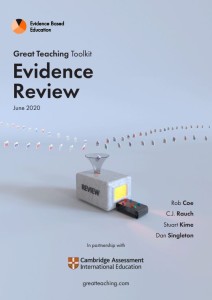If you want to learn more about improving teaching with psychology research, I’ve got good news:
There are SO MANY excellent books to read.
I’ve also got bad news:
There are SO MANY excellent books to read, we can struggle to manage them all.
In fact, as I’ve written elsewhere, I think the “best book to read” depends on the category of book you’re looking for.
At the beginning of your research+education journey, you probably want a book devoted to one topic: say, working memory, or motivation, or attention.
As you get more familiar with different categories of research, you might instead want a book that brings many topics together.
Today I’d like to recommend a book from the second category: the Great Teaching Toolkit: Evidence Review from Evidence Based Education. (You can read about it and download it here.)
Step One: How to Begin?
Anyone striving to write a book that “brings many topics together” starts with an enormous challenge: how to organize such a behemoth?
We have SO MUCH pertinent research on SO MANY topics: how can we possibly tidy this muddle?
The Toolkit’s authors devise a sensible sorting strategy. They believe research gives teachers strong guidance in four areas:
What sorts of knowledge do teachers need?
How can we make classrooms emotionally safe?
How can we structure classroom work and routines efficiently?
What teaching strategies require students to think hard?
Now, other authors organize their thinking in other ways. (For instance: Dan Willingham’s Why Don’t Students Like School focuses on nine key principles from cognitive science that should guide instruction.)
But I think you can see right away why the Toolkit’s organizational structure sounds so helpful and sensible.
Step Two: Break It Down
Within each of these categories, the authors offer between 3 and 6 specific principles: everything from “teachers should know common misconceptions in their discipline” to “strategies for asking questions effectively.”
This structure, in turn, allows for a straightfoward teacher-development plan.
If I were using this Toolkit with a faculty, I would have teachers select one of these sixteen topics: prefereably one where they feel the least confident and successful.
Each teacher would then dig into the research-base suggestions provided right there in the Toolkit.
Even better: the Toolkit reviews the research it summarizes. Teachers and school leaders who want to know exactly why this strategy or topic has been prioritized get all the info they need to dig deeper and discover more.
Examples, Please
You have, no doubt, heard that feedback is essential for student learning.
Imagine that a teacher reviews the Toolkit’s list and determines that s/he really needs to work on this specific part of her craft.
Turning to section 4.4, this teacher quickly gathers several useful insights about the role of feedback in our work.
In the first place, the Toolkit draws a helpful distinction between feedback that helps the teacher — by giving us information about how much our students know and understand — and feedback that helps the student — by giving them structured ways to improve.
That simple distinction sounds almost too obvious to state out loud…but in my experince isn’t emphasized nearly often enough.
In the second place, the teacher will find several thoughtful prompts for further thought.
As the authors wisely say: “there is no simple recipe for giving powerful feedback.”
Should the teacher remind the student of the success criteria, or point out gaps between the current work and those criteria?
The Toolkit doesn’t offer prescriptive answers because research can’t do that. Research can provide us with options, and let teachers sort out the best ways to put all those options together.
And, if you’re a research nerd (as I am), you’ll be delighted to find almost 20 pages of discussion on their sources for these ideas, and their methods for sorting them all together.
TL;DR
You already know several specific cognitive-science informed teaching strategies? You to want a bigger picture?
The Great Teaching Toolkit will be a feast for you. (And yes: you can download it free!)




